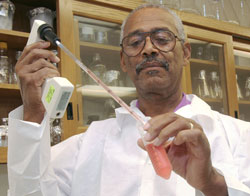|
|
Immunologist Seeks Patent For Melanoma Vaccinedownloadable pdf
A vaccine against melanoma — the most deadly form of skin cancer — provides almost complete protection in mice and could lead to a similar treatment for people, according to a University of Florida immunologist who has developed a novel treatment for the cancer. The vaccine uses inactivated or dead melanoma cells in combination with a super-antigen to boost the immune response in mice against malignant melanoma cells, said Howard Johnson, a professor of immunology at UF’s Institute of Food and Agricultural Sciences. Super-antigens are proteins that are potent stimulators of immune system cells. He said UF is in the process of obtaining patent protection for the vaccine and licensing the technology to a pharmaceutical company. Once the vaccine is licensed, human clinical trials can begin, a process that could take three or four years. “Until now, super-antigens have never been used in a cancer vaccine, and our research shows that these proteins help provide a strong immune response against malignant melanoma,” said Johnson, an internationally recognized immunologist who was the first to show that molecules called interferons are important regulators of the immune system. “We have found that combinational therapy of super-antigens and inactivated melanoma cells can protect 60 to 100 percent of the mice against a 25-fold lethal dose of melanoma,” Johnson said. “More importantly, when vaccinated mice were challenged a half-year later with a lethal melanoma dose, 80 to 100 percent survived the second challenge, which is essentially complete protection.” Johnson’s vaccine would primarily benefit two groups of people: the elderly and those who have already had a melanoma lesion.
“As we age, we become more at risk for developing melanoma and other cancers,” he said. “People who have had melanoma lesions successfully removed are at greater risk of developing future lesions, so vaccination should reduce the risk of recurrence,” he said. Howard Johnson, johnsonh@ufl.edu
|
||

